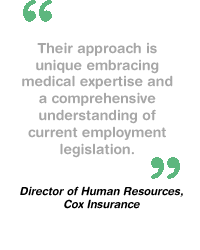
Balancing compliance with commitment
In the face of increasing legislation, new government initiatives and business operational targets a co-ordinated approach to occupational health has never been more important to assure cost-effective compliance in delivering a duty of care.
Occupational health support has become a ‘need-to-have’ rather than a ‘nice-to-have’ for any employer. Matters pertaining to employee health are usually sensitive and often difficult to understand and manage, occupational health allows management to be one stage removed and to only act on practical recommendations. This is where professional advice can be of significant value:
- Actively managing sickness absence including considering capability decisions
- Managing any perceived ‘work related’ issues whether they be physical or mental health issues ie: accidents at work, RSI, stress related absence
- Recruiting individuals to roles where safety could potentially be an issue ie: ensuring an employee working at heights or driving at work does not suffer with epilepsy
- Considering the Equality Act, and the requirement for ‘reasonable adjustments’
- Considering ‘adjustments’ and for how long they might need to be in place
- Compliance with Health & Safety obligations eg: night workers health assessments etc
- Health surveillance for those potentially exposed to issues that might compromise their health ie: noise/ dust/ vibration etc
- Drug and alcohol policies and testing in the workplace etc..
Absence management — when Occupational Health can pay for itself
Good occupational health support can save money lost to absenteeism. Research from the CIPD suggests that on average sickness absence costs employers £692 per employee every year with 7.4 working days lost per employee per year. This represents 3.3% of working time.
Absence can be on account of multiple short-term sickness absence, long-term sickness absence, poor performance and behavioural issues can also result in reduced productivity and inefficiencies within the business.
Maitland would recommend that each company ensures it has:
- Sound policies and procedures in place for the recording and the active management and referral for sickness absence
- That contact is maintained at regular intervals with absent employees
- That if absence persists either long term or on a frequent short term basis that professional occupational health advice is sought in respect of offering employee support, managing absence and assisting and advising on return to work strategies
- Return to work interviews and debriefs are conducted by management
- Adjustments and reviews are put in place if feasible and recommended for defined periods
- Ongoing review and/or support is made available for the employee and for management if necessary
Reducing absenteeism undoubtedly saves money and increases operational efficiency. Maitland help to reduce each organisation’s potential exposure to the costs of absenteeism. That is why more businesses are choosing to work closely with a specialist occupational health partner to help reduce absence and to support it’s active management when it occurs.




